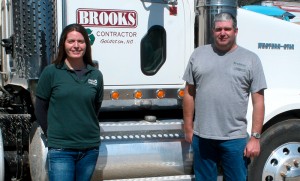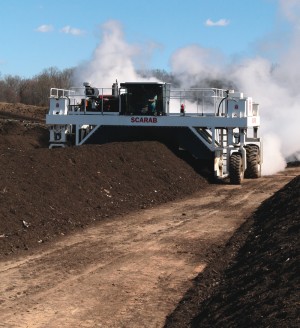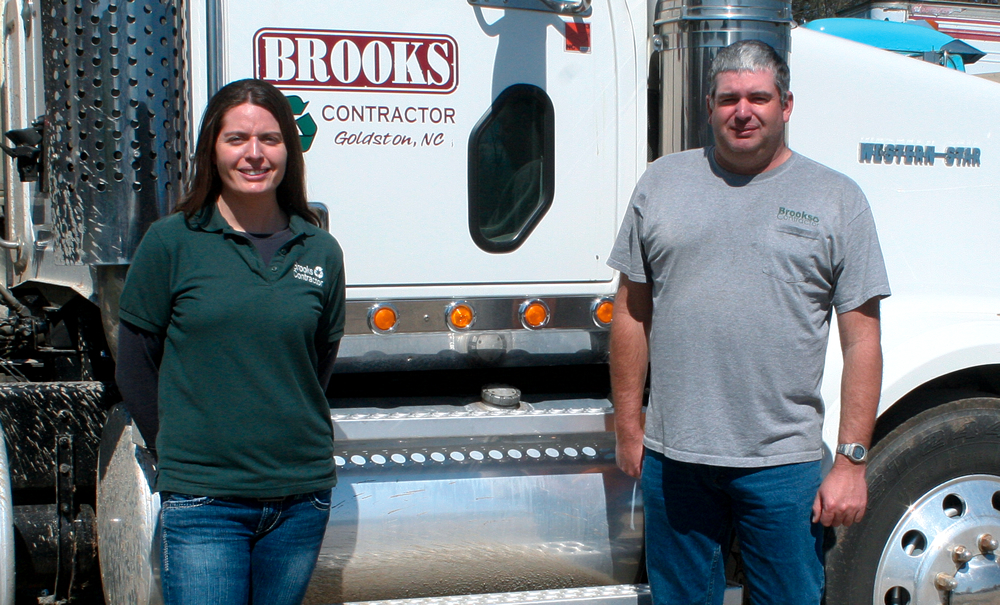Carolina composting company takes technique — and technology — to the next level.
Larry Trojak
BioCycle July 2013, Vol. 54, No. 7, p. 30
Brooks Contractor in Goldston, North Carolina has a knack for combining innovative approaches with proven ones to turn problems into solutions. With roots in the dairy industry, Brooks Contractor’s move to composting was one of basic economic necessity, according to Amy Brooks, the company’s food residuals collection manager, and daughter of its founder, Dean Brooks. “We have just under 400 acres here in Goldston and back in the late 1980s the going got very tough for the dairy industry,” she says. “Struggling to make the mortgage payment after we dissolved the dairy, my father bought a dump truck and started hauling gravel. At the time, he’d heard that a local poultry hatchery was trying to do some composting but just couldn’t get it right. Because we were already composting some of our manure, he talked to them and helped straighten some things out. More importantly, however, he came away convinced that he could do that kind of work for himself and, not too long afterwards, laid the groundwork for what you see here today.”
It’s important to note how integral the poultry industry is to a start-up enterprise like Brooks. According to the North Carolina Poultry Federation, poultry represents $12.8 billion in economic impact for the state, creates over 110,000 jobs, is the top ranked agricultural industry in North Carolina, and comprises 40 percent of the state’s total farm income. In short it was a great resource right in the Brooks’ backyard. “Dad knew that eggshells were nature’s pure form of calcium carbonate and, because they were a great slow-release source of lime, would be a perfect fit for compost,” Brooks adds. “Out here, eggshells go from the hatcheries to a dehydrating plant, where the liquid protein is extracted and sent off for use in the manufacture of dog food or other products. Even though eggshells are the toughest product we work with as far as odor and abrasiveness to equipment, they remain a key ingredient because our state’s farmers need that lime source.” The facility receives over 200 tons/week of eggshells to process.
Thought For Food
In 1999, with the business established, Dean Brooks began looking for additional material to supplement the feedstock and immediately found one that could be the solution to multiple challenges. “Dad was aware that huge volumes of food waste were being landfilled every day throughout the area,” Brooks explains. “He recognized that landfilling all that food waste meant burying an excellent source of nitrogen for the composting operation and used up needed landfill capacity. In that first year, he designed a truck to collect food waste and landed a contract with Orange County Solid Waste to divert food waste from businesses within the county. What started with just a few brave customers grew to collecting from over 30 locations under the county’s program. Today, our food waste collection service has grown steadily and we collect from 150 sites throughout central North Carolina, including the Orange County program.”

Amy Brooks and her brother Alan Brooks (inset) help manage the company started by their father, Dean Brooks.
Turning Successful
With growth came change, including the volumes of incoming material. The company takes in over 60,000 tons of material a year, including over 12,000 tons/year of food waste, as well as trimmings from a few select landscapers and nurseries/ public gardens. Brooks has an impressive fleet of equipment to get from basic feedstock to finished product. One of the constants throughout their two decades in operation, however, has been its choice of compost turner. According to Alan Brooks, the company’s site manager and Dean’s oldest son, they’ve recently taken delivery of a new 600 HP Scarab turner, the third Scarab unit they’ve owned since starting in business. “We’ve always been satisfied with the performance we’ve gotten from our windrow turners and the level of support Scarab has provided,” he says. “Because we’ve grown so much, what we were looking for in a new machine was added efficiency and we got it. A row that used to take 30 minutes to turn can now be done in five. And because the whole turning process is completed more quickly, there is an impressive fuel savings — even with the larger motor. It’s really turned our heads.”

Brooks Contractor’s new windrow turner with a slow-speed, belt-driven drum has increased composting efficiency and is well-suited to withstand abrasive feedstocks such as eggshells.
The slow-speed, belt-driven drum on the new turner was also a huge selling point for Brooks. He liked the fact that, by design, it is less aggressive and, as a result, doesn’t chop the material as badly, leaving any plastic residue in larger pieces and a lot easier to remove. “That plastic can be anything from tags and labels you find on produce, to plastic utensils and film plastic,” he explains. “There is a lot of argument for a more aggressive drum — and Scarab still makes both styles. But the efficiency of this drum is ideal for us.”
Brooks Contractor just added an Airlift Separator, purchased with grant funds from the state’s Recycling Business Assistance Center. “It is a vacuum system to remove plastic from the stream after screening, so having larger pieces actually works to our benefit,” adds Alan Brooks. “We are still making adjustments to find the right settings to remove the plastic.” While the company is hopeful that the Airlift Separator will be effective at removing plastic already in the waste stream, its goal is to try to alleviate the problem at the front end. “I would really like for the universities, hospitals and different institutions that we work with to make better decisions about packaging,” notes Amy Brooks. “Having them force their suppliers to focus on sustainable packaging means we wouldn’t have this after-the-fact problem. In addition, North Carolina’s local food movement has given us reason to do better with our resources. Once a business sees how easy and beneficial it is to separate their food waste for composting, they are able to utilize that positive direction throughout all their decisions.”
Agricultural Markets
Despite growing competition for the food waste stream — primarily from diversion of grocery store residuals to animal feed — the future still looks very bright for Brooks Contractor. “We are selling out about 40,000 tons of compost and blends and the demand just keeps growing,” says Amy Brooks. “Our customer base includes both small vegetable producers and larger row crop farmers, cattle farms, golf courses, landscapers, contractors who use bioretention soil, etc. With the model we’re working on, I’d like to see a hefty percentage of our compost be used on farmland. For us, the food waste collection has been such a huge part of our business and it is a shame to not connect generators of food with the farmers. It is imperative for North Carolina to utilize the exchange of urban and rural resources, ensuring the state’s economic viability and resilience.”
To help develop the agricultural market, Brooks started giving farmers with an agricultural tax exemption status a substantial discount on compost about five years ago. The company also developed an agricultural-grade compost to service this market. As a result, Brooks Contractor has seen a huge increase in the number of farm customers. “With the ‘closed-loop’ system we provide in food waste collection, small farms are now able to make a connection to a restaurant or grocery store we’re collecting from,” explains Amy Brooks. “Demand for local, healthy food in North Carolina will not subside. It will only take up more and more of the plate as time goes on. I feel like supplying the community with services and products that help to grow healthy food is one of the most important things we can do. We will continue with farm discounts and donations to educational projects as long as we are able. We may miss out on revenue in the short term, but the long range forecast is looking pretty good for us and for North Carolina.”
Larry Trojak is with Trojak Communications in Ham Lake, Minnesota.










